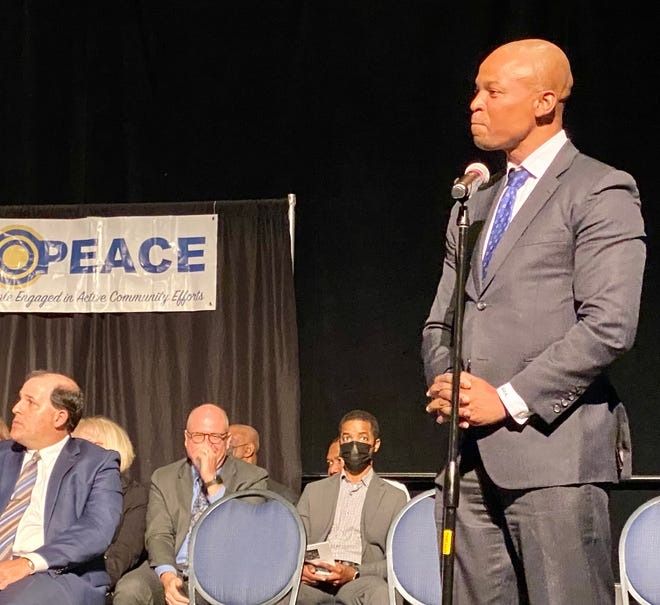By Wayne Washington, Palm Beach Post
A collection of faith and community leaders demanded action Monday night from Palm Beach County officials on a host of societal ills, including juvenile arrests and the lack of affordable housing and options for those struggling with mental illness and addiction.
Leaders of PEACE, which stands for “people engaged in active community efforts,” used the group’s annual action assembly at the Palm Beach County Convention Center to pepper a pair of county commissioners, State Attorney Dave Aronberg, Dan Eisinger of the Palm Beach County Public Defender’s Office and Ann Berner of the Southeast Florida Behavioral Health Network on why more progress has not been made.
PEACE’S directness, along with its willingness to highlight spurned invitations to its events and to publicly express disappointment in an elected official’s responses, has occasionally angered elected officials.
This year, two officials — Aronberg and Commissioner Mack Bernard — gave answers that didn’t completely square with what what PEACE wanted to hear.
Juvenile arrests: State attorney says a new policy will be in place soon
Aronberg had pledged to provide a written policy to PEACE detailing its plan to refrain from arresting juveniles for first-time non-violent misdemeanors and instead issue civil citations that don’t leave a juvenile with a permanent record.
Aronberg told the audience that his office has crafted a new policy that is being reviewed by law enforcement and the state Department of Juvenile Justice.
Not good enough, said Jill Hanson, an immigration advocate and PEACE’s co-vice president, who reminded Aronberg that he had promised to share the policy with PEACE and its activists at the assembly.
“We are very disappointed,” Hanson told Aronberg as he stood at a microphone not far away. “We have come to expect delays from public officials. We expected more from you.”
Aronberg told PEACE the policy has been changed and promised to be prepared to share it by May 1.
“We’re all on the same page here,” he said.
Eisinger said the public defender’s office supports an end to juvenile arrests in cases of non-violent misdemeanors.
Bernard disappointed PEACE by refusing to pledge support for an affordable rental housing trust fund.
Affordable housing vs. workforce housing: PEACE leaders say there is a difference
PEACE leaders noted the scarcity of affordable housing in Palm Beach County and noted that the county’s efforts to address the problem have been focused on so-called “workforce housing” for people in jobs like teaching, fire rescue and law enforcement.
There needs to be more effort made to help those with lower incomes who have even fewer housing options, PEACE officials said.
“The county focusing almost exclusively on workforce housing is leaving a lot of people out of luck,” said James Pettit of St. Patrick Catholic Church.
Bernard, who began speaking only after County Mayor Gregg Weiss left the auditorium to avoid violating public meeting rules, said he could not commit to supporting an affordable rental housing trust fund until he saw how the $200 million housing bond would be used.
County voters approved that bond in November, with proceeds directed to providing affordable and workforce housing.
“I don’t know if I can support this trust fund when voters just approved a housing bond,” Bernard said.
Pettit said PEACE would take Bernard’s response as a “no” on support for an affordable rental housing trust fund.
Bernard reminded audience members that the language of the bond referendum specifically mentions both affordable and workforce housing and noted that he supports the building of both.
Weiss, speaking after Bernard left the auditorium, had a slightly easier time on stage, pledging his support — in principle — for an affordable rental housing trust fund.
But Weiss would not commit to a specific amount, saying he needed to know what the county’s budget would look like before he could back any particular figure.
Mental illness and addiction: Is there a commitment to help?
In addition to specific action on housing and childhood arrests, PEACE sought a commitment from Berner to work with the group over the next year to research and identify the best ways to connect those struggling with mental illness and drug addiction to the services they need.
Berner and audience members heard the visceral accounts of local parents Richard and Gail Kazmar as well as Sany Lackey, who detailed how they lost a child to depression and addiction.
Lackey explained that she had pleaded with facilities to provide a place for her son, Eric, who became depressed and drank excessively after being abused as a child.
“I tried for three years to get him help,” Lackey said through tears in Spanish. “I turned to everyone. I begged the hospitals. I called everywhere. Nothing worked. Four months after my son died, the mental health facility finally called me back and said they would help him now. But they were four months too late.”
Berner said she’d work with PEACE to find more and better options for people struggling with mental illness and addiction.
“I know we can do better,” she said.
View the original story here.






